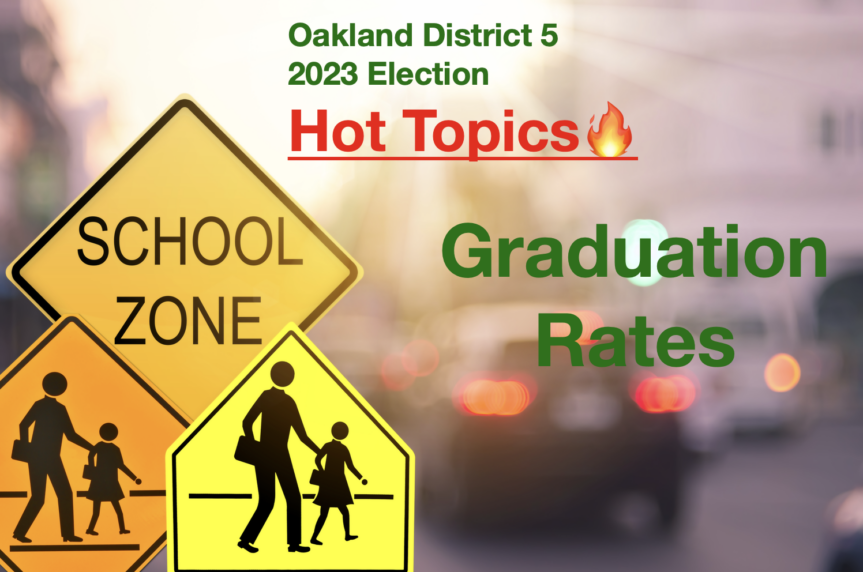There is one election in Oakland this year, for the District 5 school board. With a divided board, the person elected will have the opportunity to cast a deciding vote. With so much at stake, we wanted to hear directly from the candidates so voters and the public can better understand their views and plans for their time in office. Students will be those most affected by the decisions the board makes, so we collected student questions from the Oakland Youth Commission to ask candidates Sasha Ritzie-Hernandez and Jorge Lerma. Look out for future posts on graduation rates, charter schools, the school-to-prison pipeline, school closures and restorative justice. Here’s what the candidates had to say about school safety.
Here is a link to the full interview with Ritzie-Hernandez.
Here is a link to the full interview with Lerma.
Graduation rates have been steadily improving but still average at 75% of all OUSD students. What do you think can be done to boost graduation rates to 100%?
Jorge Lerma
Graduation rates have been improving, but let’s break it down. Different ethnic groups, different cultural groups have different results. I don’t accept that improvement must be a crawl or a simple little improvement. I’m not satisfied with simple improvement. I want to see acceleration. I want us to break out of this cycle of just slight improvement. No, we want to break out completely. And it starts with the question of, ‘What’s the objective of high school graduation? Just to graduate with a high school credential? Or is it about graduating with A through G requirements to go on to college? Or is it to graduate to get in some kind of career training?’ So there’s a couple of questions that I have about high school graduation rates. Yes, overall, there’s improvement. All the high schools that I’m aware of are doing a terrific job, principals, teachers and staff. But we need to accelerate what we’re doing, so that graduation is not just a diploma, but our map to the future.
Sasha Ritzie-Hernandez
It’s really interesting because I’ve just been looking at some data around our district and two of the biggest challenges are literacy and math. Definitely one of the things that I feel like is missing in our district that can support our academic achievement is really evaluating the programs that we have in place now, see what are the best practices, what is working, but also being innovative. If things are not working, if we keep buying the same product or using the same service, and we’re not receiving the results that we need, then there needs to be a shift. I’m very interested to see what programs are working in our district, so that way we can share best practices. That’s another thing that I’m really interested in is creating an opportunity for us to work together. Because as a community, specifically in District 5, I want us to get to a space where schools are talking about what is working for them, what isn’t working and share ideas. OUSD has a tendency to work in silos. One of the things that I want to ensure that we do is that we are building bridges, that we’re able to work together. And if we see that a program or service is working for a specific school, how do we learn from their lessons to move other schools? I think literacy and math will be one of my priorities, we need relevant curriculum. I can tell you as a student of color, that growing up (for) math, I was always told, ‘Oh, math is difficult. Math is difficult.’ And so a lot of our students of color are growing up with this idea that math is so difficult, that it is going to be really hard. We need to move away from that, we really need to move in a more growing mindset that allows us to really see our students’ potential, and not just where they are right now. That is something is just shifting the culture and the way that we address academic achievement is also very important. We need to celebrate also those students who are doing really well, we need to ensure that when one of our schools is thriving, and is doing really well, again, that they share those best practices, and that we document them and we are able to celebrate them as well. I think it’s going to take a lot of evaluation and see what have we been doing for the last two decades that has resulted in such a gap.

